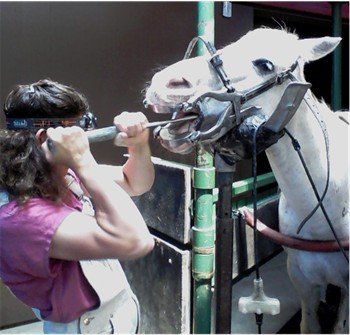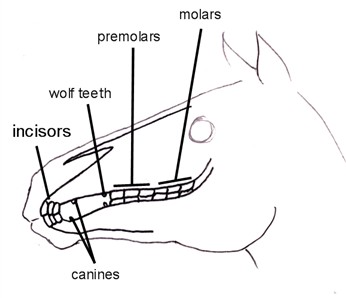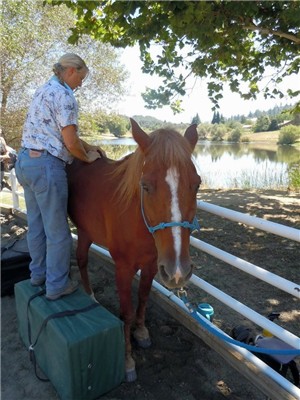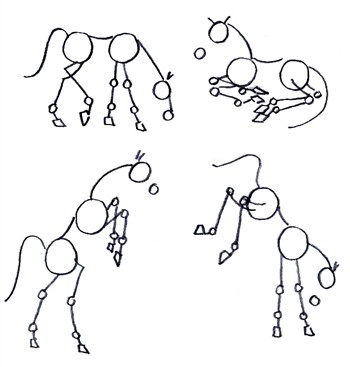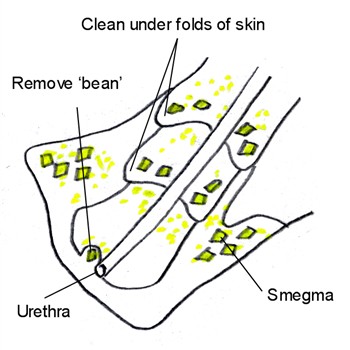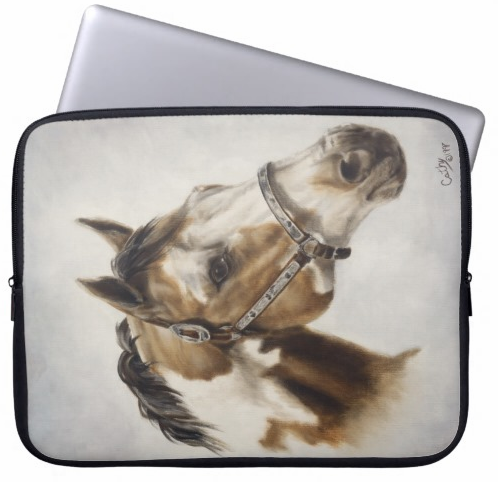Floating Horses Teeth - What and Why
What You Need to Know About Equine Dentistry
What is floating a horses teeth? It's a dental procedure preformed by a large animal veterinarian. The purpose of floating is to remove sharp points that have developed on the teeth, and encourage an even grinding pattern to aid in digestion.
I find it interesting that a horse's teeth never stop growing. It’s kind of like having a giant hamster! We give hamsters chew sticks to keep their teeth from growing too long. So what about horses? If you’re thinking a horse will grind their own teeth down naturally by chewing on all that roughage, you’re right. The only problem is, that they don’t always grind them down all nice and neat and even.
Like a lot of horsemen, I used to think that only old horses needed their teeth floated. Boy was I wrong! My vet says that she has had to perform this dental procedure on horses as young as 8 years of age. Many of her patients require this equine dentistry every two years.
By contrast, my farrier took his 33 year old gelding in to have its teeth looked at. The horse had never had a dental treatment in his life. The vet took one look at the horse's teeth and found them to be in perfect health and condition!
Obviously there is a huge variance in the need for dental care from horse to horse. So how can you tell if your horse is in the need of a little horse dentistry? The only sure fire way is to have a veterinarian take a peak inside your horses mouth next time you’re getting his vaccines. But you, being the observant equine owner that you are, are likely to spot the need for yourself.
10 Signs Your Horse May Need Her Teeth Floated
- Dropping grain from the mouth while eating
- Heavy salivating or drooling while eating
- Weight loss
- You notice plenty of undigested hay in the horses manure
- Signs of tooth or gum pain
- Shows discomfort or resistance to taking the bit
- Leaving a more than normal amount of hay uneaten
- Taking too long to clean up the usual hay feed portions
- Suffers from bouts of equine choke
- A horse that has never cribbed in its life suddenly begins biting and chewing on wood
6 Things You Don’t Want To See With Equine Teeth
- Sharp points
- Uneven ‘wave’ pattern on the molars
- Abscessed tooth
- Loose teeth in adult horses
- Irritation or ulcers on the gums
- Drooling
When a horse develops points on the teeth, they can get so bad that the points dig down into the gums with every bite. Ouch! The pain is enough to cause loss of appetite and feed to drop from the mouth. This will also cause the horse to have difficulty properly chewing their food and irritate the gums. Horses that have worn their teeth unevenly into a wave pattern can also have a hard time grinding all that roughage down.
With all that half chewed food working its way through your horse’s gut, you have the perfect scenario for impaction colic. This could spell a death sentence for your horse. Why chance it?
Your vet can quickly spot any problems that need to be addressed with your horses teeth and take care of it muy pronto with a little equine dentistry. In case you are wondering…..floating horses teeth goes something like this:
The horse is sedated to the point that he is still standing, but is relaxed enough to tolerate the procedure. The vet uses a handy little gadget called a speculum, that holds the horse’s mouth open. Then he’ll take huge electric powered rasp and start grinding the sharp pointed surfaces down.
Sounds awful doesn't it? Don’t worry. It doesn't bother your horses teeth near as much as it bothers you! I have to warn you though, floating teeth stinks! I mean it smells. The ‘tooth dust’ that starts flying really smells bad. But in the end it’s all more than worth it. If your horse is in his older years, the vet might give him something for pain afterwards. Young horses usually don’t require it.
It is amazing how happy your animal is after a little horse dentistry. Having your horses teeth floated allows her to eat pain free AND come away feeling satisfied after a meal…what a relief!
More Equine Topics for You
How to Draw a Horse
Six easy step by step horse drawing lessons. Learn to draw horse heads and horse hooves too.

